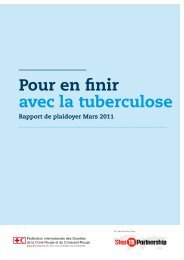Thailand - Stop TB Partnership
Thailand - Stop TB Partnership
Thailand - Stop TB Partnership
You also want an ePaper? Increase the reach of your titles
YUMPU automatically turns print PDFs into web optimized ePapers that Google loves.
Program management<br />
Administration<br />
Following the reorganization of the Department of Disease Control (DDC), the <strong>TB</strong> Cluster<br />
was incorporated into the Bureau of AIDS, <strong>TB</strong> and STIs. The <strong>TB</strong> Cluster is responsible for<br />
developing and planning <strong>TB</strong> policies, training health workers, and monitoring <strong>TB</strong> control<br />
activities countrywide. Reportedly, the reorganization has resulted in blurred lines of authority<br />
and lack of clarity on roles and responsibilities within the new system.<br />
National <strong>TB</strong> coordinators monitor NTP implementation in <strong>Thailand</strong>’s four geographical<br />
regions (north, northeast, central, and south) and provincial <strong>TB</strong> coordinators (PTCs)<br />
operate in each of the country’s 76 provinces. <strong>TB</strong> staffing levels vary considerably among<br />
provinces. Regional <strong>TB</strong> centers are integrated into the Regional Office of Disease Prevention<br />
and Control (ODPC) as part of the Bureau of AIDS, <strong>TB</strong> and STIs and are responsible for<br />
monitoring, training, and supervising <strong>TB</strong> health workers at the provincial and district levels.<br />
PTCs work closely with district <strong>TB</strong> coordinators (DTCs). DTCs coordinate <strong>TB</strong><br />
control activities, often in collaboration with <strong>TB</strong> clinics in hospitals. The PTCs, DTCs,<br />
and local health center staff are responsible for implementing the District <strong>TB</strong> Control<br />
Programme, which provides for quality-controlled <strong>TB</strong> case detection and treatment services<br />
and coordination of the network of DOTS providers at the subdistrict level. DTCs also evaluate<br />
and report treatment outcomes to the PTC every four months.<br />
<strong>TB</strong> clinics are based in district, provincial, and regional hospitals. <strong>TB</strong> diagnosis is<br />
largely conducted by doctors in district and provincial hospitals, which have laboratory testing<br />
and x-ray facilities. <strong>TB</strong> treatment is provided in district and provincial hospitals as well<br />
as in health centers at the subdistrict level, where village health volunteers coordinate with<br />
local health workers to ensure access to treatment and to monitor treatment adherence.<br />
Many <strong>TB</strong> experts report that roles and responsibilities within the reformed health<br />
system are not clear and that “everything is up to interpretation.” As a result, all offices of<br />
the ODPC at the regional level oversee <strong>TB</strong> work according to their own perspectives and priorities.<br />
Under these circumstances, some regional offices decide that <strong>TB</strong> is not as urgent as<br />
other diseases and consider scaling back <strong>TB</strong> services an acceptable cost-saving measure. 113<br />
In this environment, <strong>TB</strong> control officials worry that some districts also appear<br />
to be cutting back their budgets for essential <strong>TB</strong> services, particularly for monitoring and<br />
evaluation. 114 To ensure that quality services are maintained during this period of transition,<br />
the NTP should ensure sufficient allocation of resources to guarantee coordinated monitoring<br />
and evaluation of <strong>TB</strong> control services at all levels.<br />
PUBLIC HEALTH WATCH MONITORING REPORTS 55


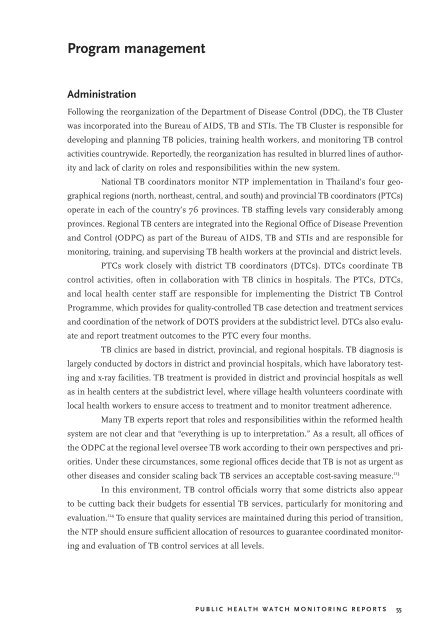
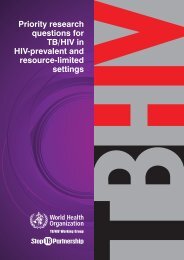

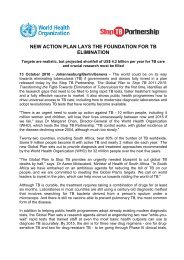
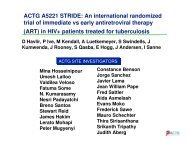
![Global Drug Facility Annual Report 2011 [.pdf] - Stop TB Partnership](https://img.yumpu.com/26788745/1/184x260/global-drug-facility-annual-report-2011-pdf-stop-tb-partnership.jpg?quality=85)

![Concept note on national stop TB partnership [.pdf]](https://img.yumpu.com/26788741/1/184x260/concept-note-on-national-stop-tb-partnership-pdf.jpg?quality=85)
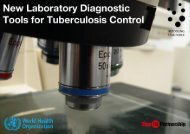
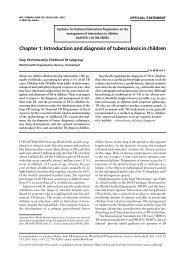
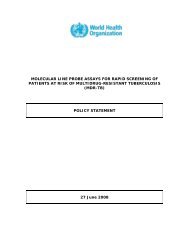
![2005 and Challenges for 2006 - 2015 [.pdf] - Stop TB Partnership](https://img.yumpu.com/26788674/1/190x245/2005-and-challenges-for-2006-2015-pdf-stop-tb-partnership.jpg?quality=85)
![Brochure (French) [.pdf] - Stop TB Partnership](https://img.yumpu.com/17234792/1/190x91/brochure-french-pdf-stop-tb-partnership.jpg?quality=85)

